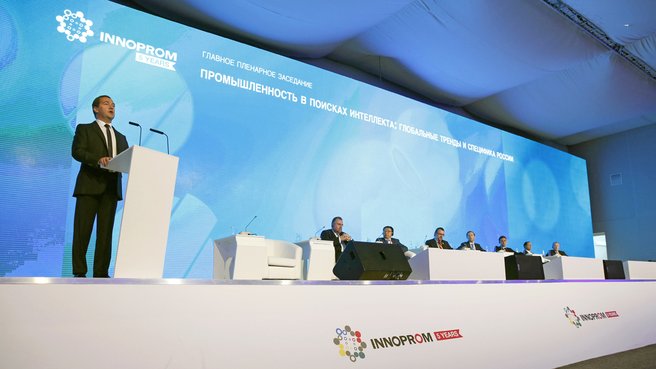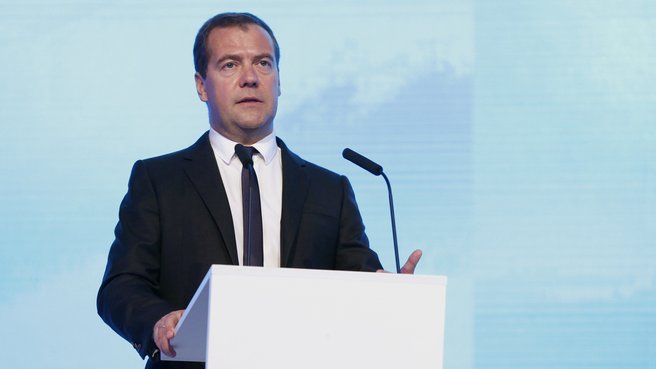Dmirty Medvedev: "The strategy for innovation-driven development poses a number of ambitious goals for our country, including increasing the proportion of industrial enterprises engaged in technical innovations to almost 50% by 2020."
Dmitry Medvedev’s address at Innoprom 2014:
Good afternoon, colleagues, ladies and gentlemen,
Welcome to the Innoprom International Trade Fair in Yekaterinburg. This is the fifth time I've seen this fair and taken part in its business programme. In fact, it has become one of the most popular venues not only to demonstrate the latest industrial designs, but also to discuss the future of the industry. I’m very pleased to see our guests here, among whom are heads of companies, experts and specialists. I’d like to thank them all for their participation in our joint discussions and joint projects which, hopefully, will help grow the potential of our companies and promote our industry.
Dmirty Medvedev: "Innoprom International Trade Fair in Yekaterinburg has become one of the most popular venues not only to demonstrate the latest industrial designs, but also to discuss the future of the industry."
Clearly, broad introduction of innovations by market leaders have helped increase the productivity and organisational effectiveness of our businesses. Recent global economic difficulties have only accelerated these processes. Many countries have reconsidered their industrial policies, and we are trying to do so as well. The draft law On Industrial Policy was approved at a Government meeting held in late June. It is now being reviewed by the State Duma. It defines the general legal framework for industrial activities, and, most importantly, properly organises measures and mechanisms to support such activities.
Provisions have been made for using traditional and innovative tools, including a special investment contract procedure. We discussed the bill with the assumption that this was just its first revision. If additional possibilities become available after adopting the law, we will, of course, go back and incorporate other ways to support the industry into the fabric of the law. In any case, we hope that this will help us be more active in implementing our national programme for the development of the industry.
Dmirty Medvedev: "Broad introduction of innovations by market leaders have helped increase the productivity and organisational effectiveness of our businesses. Recent global economic difficulties have only accelerated these processes. Many countries have reconsidered their industrial policies, and we are trying to do so as well."
The strategy for innovation-driven development poses a number of ambitious goals for our country, including increasing the proportion of industrial enterprises engaged in technical innovations to almost 50% by 2020. In order to achieve these objectives, it’s imperative that we conduct large-scale retrofitting and modernisation of the industry, and encourage, including through taxation mechanisms, the replacement of obsolete equipment and a transition to the use of the best available technologies. We will also facilitate the implementation of major projects as part of our technical development priorities, and will continue creating innovative infrastructure and institutions of guarantee and credit support for high-tech exports. We have made good progress in this area recently.
It is particularly important that we support those areas that can dramatically improve the effectiveness of all the production stages, from product design and engineering to manufacturing and post-sale servicing. We are talking about establishing in Russia the production of high-precision manufacturing equipment, including computer-controlled machines, industrial robots, and 3D printers, which have become quite popular in a variety of fields recently. We should adopt a combined approach toward encouraging the accommodation of manufacturing facilities and research centres in Russia and, of course, limiting, in compliance with the requirements of the World Trade Organisation, the imports of finished products for which we have readily available competitive domestic counterparts, including through regulation of the public procurement system. We are now working on a number of new opportunities, including admission of certain foreign products to the public procurement system, if the manufacturer undertakes to locate production in Russia within a few years. This is a new plan for us, and we will see how to go about it.
Dmirty Medvedev: "The strategy for innovation-driven development poses a number of ambitious goals for our country, including increasing the proportion of industrial enterprises engaged in technical innovations to almost 50% by 2020."
In April, we approved a sub-programme for the machine-tool industry as part of a major state programme for the industry with funding totalling 5.5 billion roubles. The joint stock company Stankoprom will serve as a system integrator. The goal is to bring the share of certain domestically manufactured equipment on the Russian market to one-third by 2020. We believe it is feasible, if not for all, then for a number of items.
Robotising manufacturing processes is a quite promising area as well.
On today’s Russian market (which is not too large and makes up about 0.5% of the global one), the automotive industry accounts for 66% of robotised manufacturing processes, although the potential demand for robotics production also exists in the metallurgy, chemical and mining industries.
Finally, another promising area includes what is commonly referred to as additive technology, which involves layered build-up of materials which are increasingly used in various industries, including the aerospace and the aviation industry, power engineering, electrical and transport engineering, medicine and many others. Of course, we will focus on them as well.
The state must continue to promote policies that foster innovation. To do so, we use various organisational arrangements. In addition to forums, we must occasionally hold meetings and discuss this subject. We have a Council for Economic Modernisation and Innovative Development. This year alone, we considered biotechnology and innovative construction technologies, including composite materials. We have discussed the pharmaceutical and medical industries as well.
Dmirty Medvedev: "In April, we approved a sub-programme for the machine-tool industry as part of a major state programme for the industry with funding totalling 5.5 billion roubles. The joint stock company Stankoprom will serve as a system integrator. The goal is to bring the share of certain domestically manufactured equipment on the Russian market to one-third by 2020."
Shortly after this very important and informative forum, we will have a meeting of the Presidium of the Council, which will focus on the use of photonics. This is also a global market that is growing rapidly and is currently estimated in the hundreds of billions of dollars. Our share in it is still modest, although admittedly much of the technical solutions have been prepared in Soviet and post-Soviet periods by our researchers. Thus, we must establish a bigger presence on this market.
I’d like to thank everyone again: our manufacturers, our foreign colleagues and all the experts and partners for taking part in Innoprom 2014. In general, this international trade fair worked out well, and is now being held for the fifth time. I think it is quite interesting.
I wish you success, mutually beneficial contracts, great projects and all the best.











